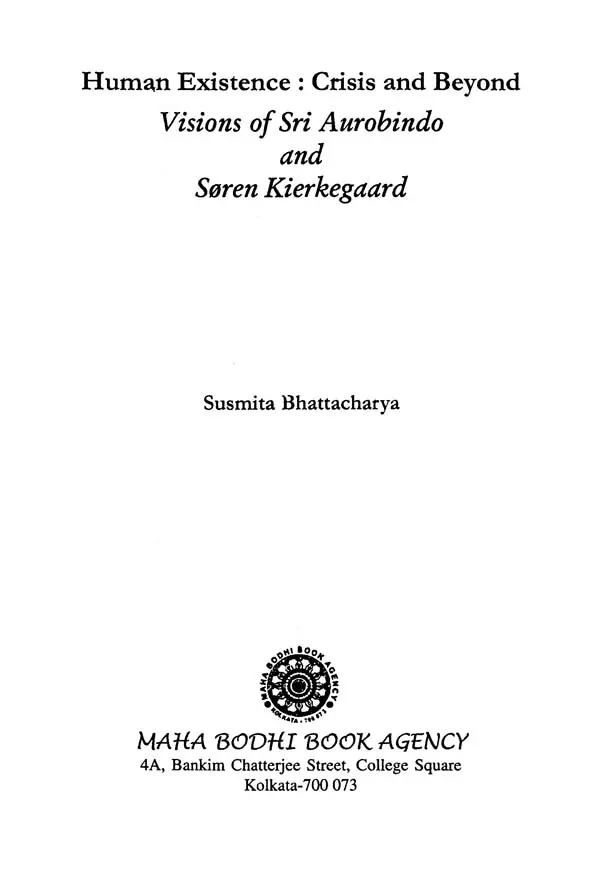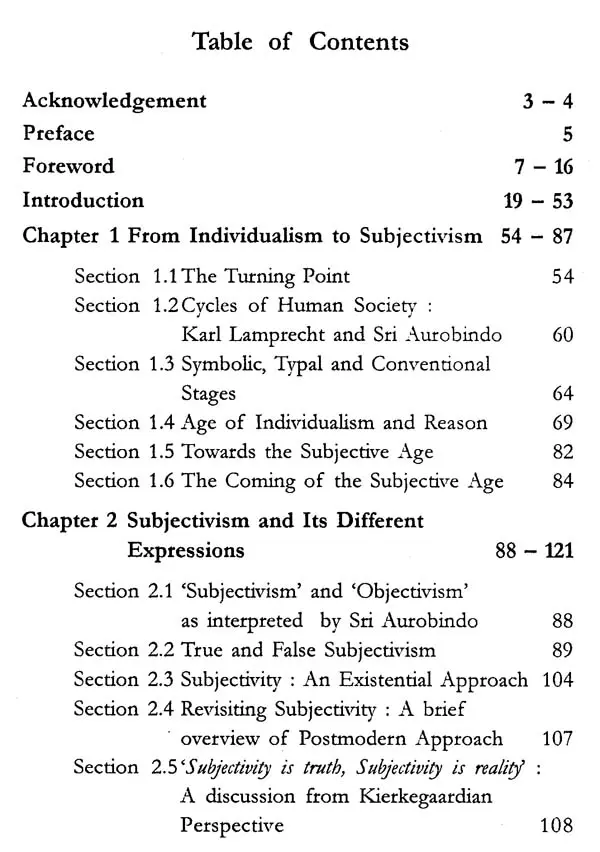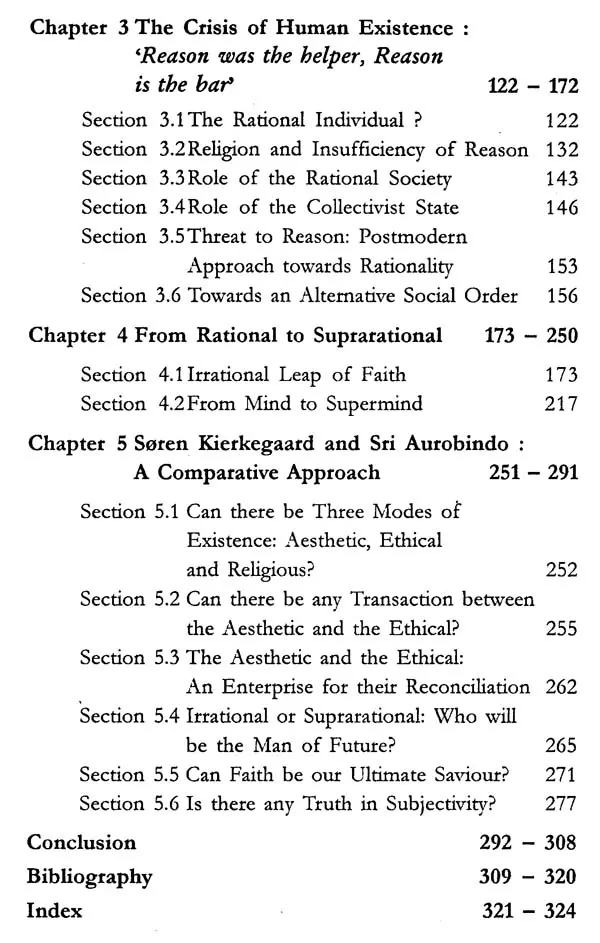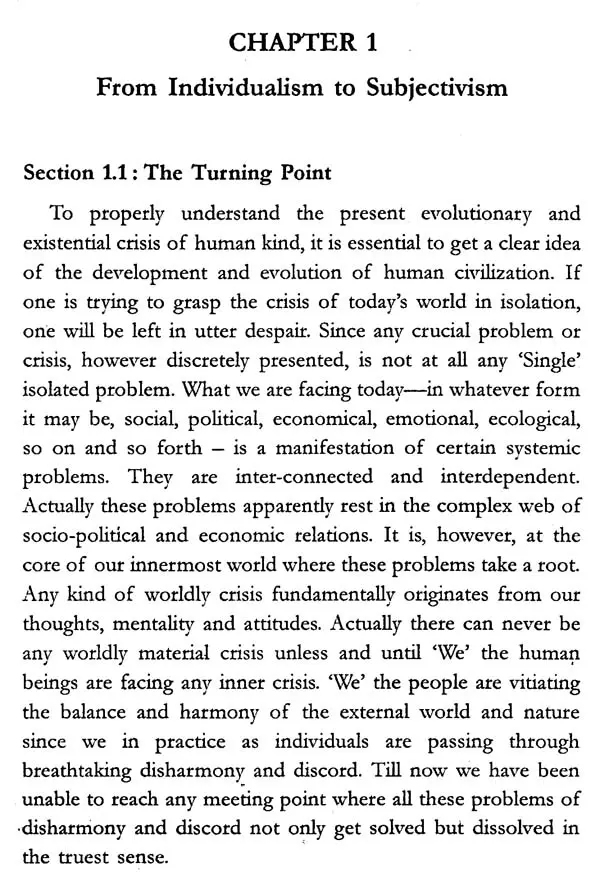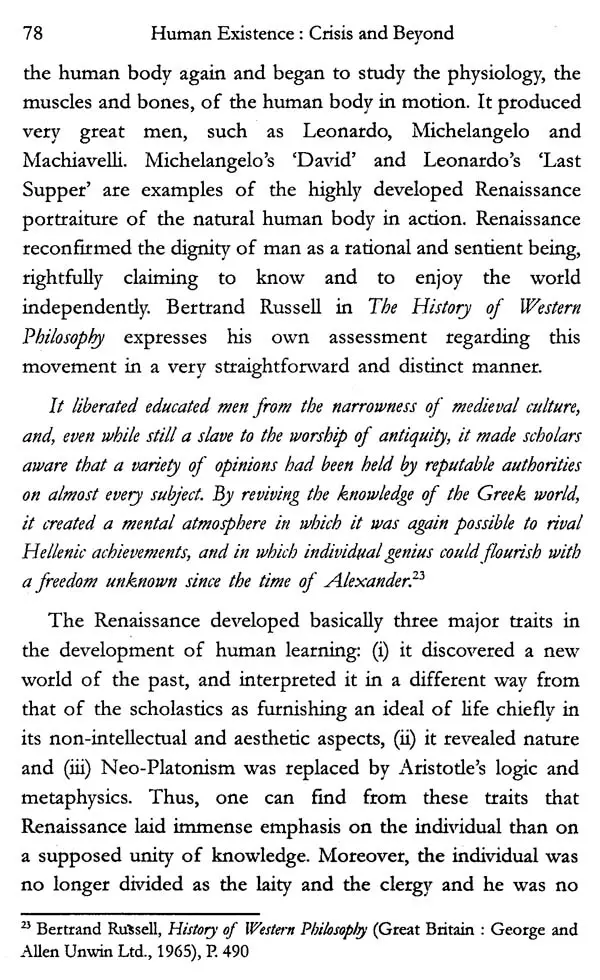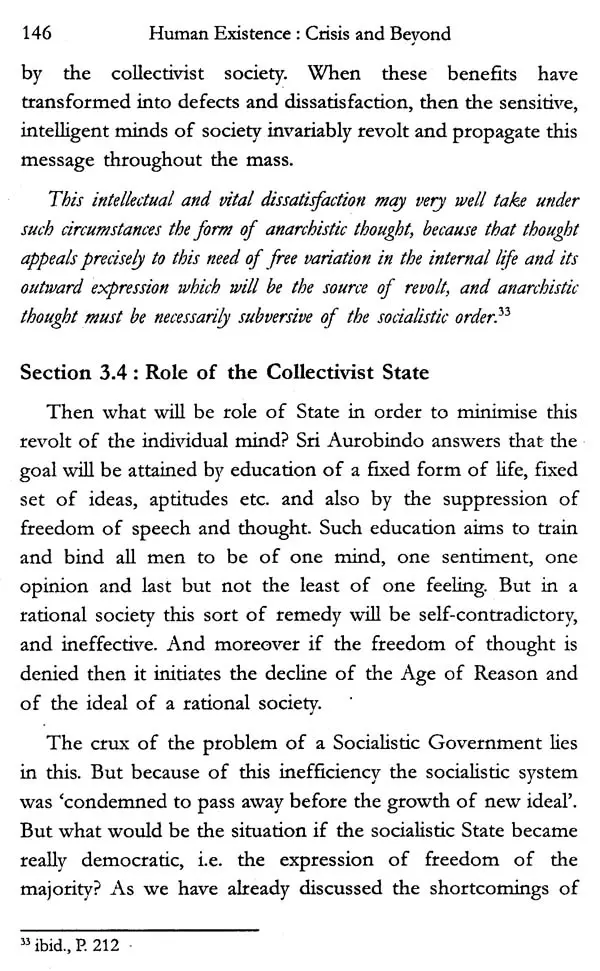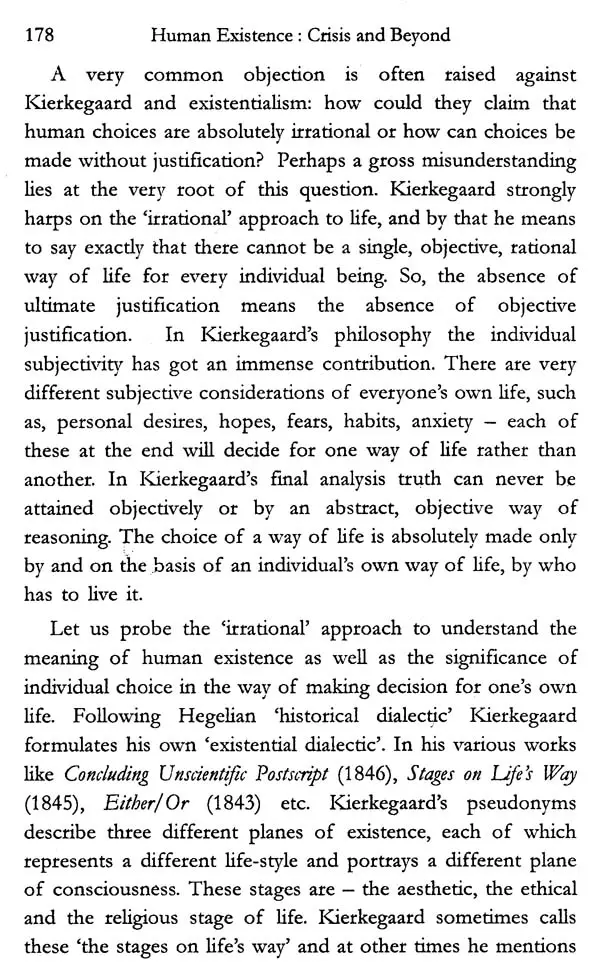
Human Existence-Crisis and Beyond-Visions of Sri Aurobindo and Soren Kierkegaard
Book Specification
| Item Code: | UAK899 |
| Author: | Susmita Bhattacharya |
| Publisher: | Maha Bodhi Book Agency |
| Language: | English |
| Edition: | 2022 |
| ISBN: | 9789384721824 |
| Pages: | 324 |
| Cover: | HARDCOVER |
| Other Details | 8.50 X 6.00 inch |
| Weight | 520 gm |
Book Description
Franz Kafka once said, "I lack nothing but myself." The universal crisis of modern life is the symptom of overall alienation of man from himself, from the other, from the world around, and from his own inner truth.
Man has always been a seeker, despite being th the crudite opacity of metually faced with t perpes and the senselessness of the workaday world. However, the world of today the world chaos, disorder, distrust and is the collapse of the natural and ethical order. We suffer from a terrible disharmony, within and without, and are cast into unrelenting torment without being able to grasp the crux of the of being As if in a Kafkaesque htmare, the joke is on us-we are all busy fleeing without knowing what it is that we so desire to escape. Sometimes the weight of an unexamined life hits us only when dusk is closing gin, when the hourglass is empty. We always catch ourselves oscillating between the truth of our identities and the apparent personas we take on, between the clutch of thousand desires and an urge to move beyond.
This book addresses the issue of existential crisis by discussing the perspectives of two thinkers inhabiting two different zeitgeists, from separate corners of the world, Soren Kierkegaard and Sri Aurobindo- the 'Father of modern Existentialism' anachronistically meets a prominent figure of contemporary Indian philosophical thought. This book does not intend to offer any universal 'mantra' for the subjective crisis of existence, but rather attempts to present an organic view by weaving in the visions of the two thinkers who had been formed by two different religious principles.
These pages set out to map the arduous journey of the contemporary individual, while engaging in a critical reflection on the thoughts and realizations of these two thinkers. When thrown into the confusion of an absurd reality, does one not feel an invigorating yearning to question any pre-established essence or dictum offered by traditional epistemic framework, religiosity and morality? The suspension of such accepted beliefs is not merely to criticise the 'givens', but also for projecting the possibilities of becoming that which is yet to be defined.
SUSMITA BHATTACHARYA is Assistant Professor of Philosophy in West Bengal Education Services since 2009. She is currently posted in Government General Degree College, Singur, Hooghly. She recently published an article entitled 'Paradox of Time: A Brief Study from Sri Aurobindo's Philosophy and Classical Indian Art' in the e-journal Philosophy Pathways, UK (issue 227). Her thesis on Soren Kierkegaard and Sri Aurobindo earned her a Ph. D. in 2014 from Jadavpur University, India. Her areas of interest in research are contemporary Indian philosophy, continental philosophy, philosophies of post modernism; and the philosophy of language specially the works of Ludwig Wittgenstein.
These are the opening lines of Charles Dickens' famous novel A Tale of Two Cities. In our recent times all of us are passing through the same experience in each sphere of daily life, society and civilization. Truly speaking, our civilization is going through a severe crisis. Most of us think that the crisis is due to globalization and loss of one's own tradition and identity, but we are wrong. Globalization and everything that is connected with it, is nothing but a condition created by "civilized barbarism" in which we find ourselves. One elementary fact we have to admit about our civilization is that it is far more developed materially than spiritually. We value too highly its material achievements and no longer keep in mind as vividly as is necessary the importance of the spiritual element in life. The discoveries of last few centuries now place the forces of Nature at our disposal in such an unprecedented way, the relations among one another of individuals, of social groups, and of States have undergone revolutionary changes. Our material knowledge and our power have been enriched and increased to an extent that no one would have thought possible. We have thereby been enabled to make the conditions of human existence incomparably more favorable in numerous respects, but in our enthusiasm over our progress in material knowledge and power we have arrived at a defective conception of civilization itself. Now a point should be kept in mind that by "spirituality" we do not mean any sort of idol-worshiping or orthodox kind of belief in creed or rituals connected with any kind of super natural deity accepted by family, society, religious institution of by a collective unconscious mass. Language is ambivalent. The same word can have so many different connotations. We are not concerned about that type of spirituality which denounces this earthly life and desires any other-worldly life, and just say 'oh well, we can't do it ourselves so it's all going to be fine in the next world. We are not advocating that kind of pie-in-the-sky approach. We are not in need of propagating another kind of unreasonable or any jaunty optimism. Previously, nature was working through the instincts of animals and they are bound to do what they are motivated by instinct to do. They are compelled to do certain things. They do not raise any questions about their actions or the purpose and meaning of anything. But there comes a stage in human development when we begin to raise a big question to ourselves: "What is the purpose of it all?" Thus we need to cultivate in ourselves an awareness of the deepest or truest part of our being which does not possess simply a metaphysical content but also makes us feel an utter discontent in our so-called complacent worldly existence. Moreover, we need to ask ourselves, irrespective of any ideological belief: Are we living in a true sense or merely surviving? Is there any deeper meaning of our being and existence over and above this material existence? It is neither the presupposed God nor any orthodox religion that can make this existence meaningful, but we the human beings with our own discontent do try to find the answers to these questions. No moral scripture, no orthodox religion can communicate to us in a meaningful way what we should live for. It is only we who can perform this task better since we are not simply psycho physical organisms, but each of us carries the infinite possibility of surpassing the pitfalls of our present existence and this is the real message of true spirituality. Even if there is a truth and that truth is known as eternal, then we have to reaffirm that truth and its relevance according to the need and language of a particular age. Thus we need to reconstruct the notion of spirituality in accordance with the psychological, sociological need and development of the present age. Throughout our human civilization men have been trying to decipher a deeper sense of good living or quality-life out of their socio-economic political and historical enterprise by overcoming his present state of being and its discontents. Thus all of us may agree on this point that we human beings are never satisfied with the given situation or present course of life, so knowingly or unknowingly all of us are in a journey for another station and alternative course of life.
**Contents and Sample Pages**
